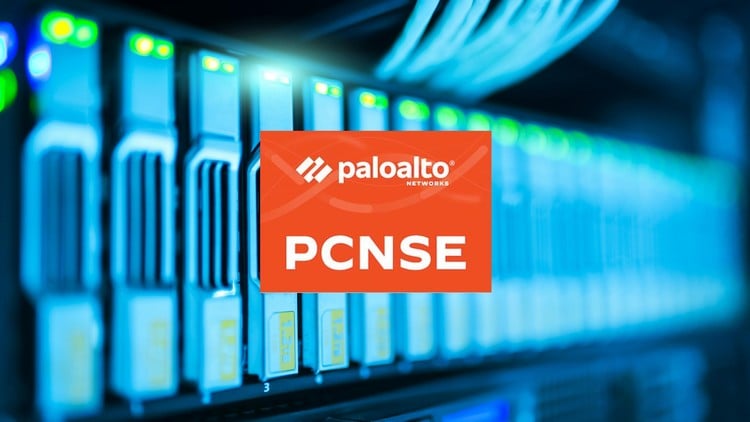
High-quality practice exams to boost confidence, identify weak areas, and prepare you for real test success
👥 487 students
🔄 September 2025 update
Add-On Information:
“`html
Note➛ Make sure your 𝐔𝐝𝐞𝐦𝐲 cart has only this course you're going to enroll it now, Remove all other courses from the 𝐔𝐝𝐞𝐦𝐲 cart before Enrolling!
- Course Overview
- This comprehensive course is meticulously designed to equip aspiring and practicing network security professionals with the essential knowledge and practical skills required to excel in the Palo Alto Networks Certified Network Security Engineer (PCNSE) examinations.
- Leveraging high-quality, realistic practice exams, this program focuses on simulating the actual testing environment, thereby enhancing candidates’ readiness and reducing exam anxiety.
- The curriculum is structured to systematically cover the breadth and depth of the PCNSE exam objectives, ensuring no critical topic is overlooked.
- It emphasizes practical application of concepts, moving beyond theoretical knowledge to foster a deep understanding of how to implement and manage Palo Alto Networks firewall solutions effectively.
- Through targeted practice questions and detailed performance analytics, students will gain invaluable insights into their strengths and weaknesses, allowing for focused study and efficient preparation.
- The September 2025 update ensures the course content remains current with the latest advancements in Palo Alto Networks technology and the most recent exam blueprints.
- This course is an indispensable resource for individuals seeking to validate their expertise in network security engineering with a globally recognized certification.
- It aims to build not just exam-passing ability, but also the confidence and competence to tackle complex real-world security challenges using Palo Alto Networks platforms.
- Requirements / Prerequisites
- A foundational understanding of networking concepts, including TCP/IP, routing protocols, and network topologies, is assumed.
- Familiarity with general cybersecurity principles and common network threats is beneficial.
- Prior exposure to firewall technologies, ideally from any vendor, would provide a significant advantage.
- Candidates should possess a working knowledge of operating systems and command-line interfaces.
- While not strictly mandatory, practical experience with Palo Alto Networks firewalls (e.g., through lab environments or professional deployments) is highly recommended for optimal learning.
- A commitment to dedicated study and practice, particularly in utilizing the provided practice exams, is crucial for success.
- Candidates should possess the ability to critically analyze complex technical scenarios presented in exam questions.
- Access to a reliable internet connection for accessing course materials and practice exams is essential.
- Skills Covered / Tools Used
- Network Security Fundamentals: Deep dive into core security concepts relevant to enterprise networks.
- Palo Alto Networks Next-Generation Firewall (NGFW) Architecture: Understanding the design principles and operational mechanics of PAN-OS.
- Traffic Identification and Control: Proficiency in application identification, user identification, and policy creation for granular traffic management.
- Threat Prevention Techniques: Mastering the implementation and configuration of features like Intrusion Prevention System (IPS), antivirus, anti-spyware, and vulnerability protection.
- URL Filtering and Content Security: Configuring and managing policies to control web access and prevent malicious content.
- Decryption Technologies: Understanding SSL/TLS decryption and its implications for security policy enforcement.
- Advanced Policy Management: Designing and implementing complex security policies based on various criteria.
- Network Address Translation (NAT): Configuring various NAT policies for network address translation.
- Virtual Private Networks (VPNs): Implementing and managing site-to-site and remote access VPNs.
- High Availability (HA) and Device Management: Configuring and managing HA clusters and central device management.
- Logging and Reporting: Effectively utilizing logs and reports for monitoring, troubleshooting, and compliance.
- Security Automation and Orchestration Concepts: Awareness of how to integrate Palo Alto Networks firewalls into broader security workflows.
- Practice Exam Simulation Platform: Utilizes a realistic exam simulator to mirror the PCNSE testing interface.
- Performance Analytics Tools: Embedded tools within the simulator to track progress, identify weak areas, and measure improvement.
- Benefits / Outcomes
- Enhanced Exam Readiness: Significantly boosts confidence and preparedness for the PCNSE certification exam through extensive practice.
- Identification of Knowledge Gaps: Pinpoints specific areas of weakness, allowing for targeted study and efficient time management.
- Improved Problem-Solving Skills: Develops the ability to analyze and resolve complex network security scenarios presented in exam-like questions.
- Validated Expertise: Successful completion leads to a globally recognized certification, validating professional skills in Palo Alto Networks security solutions.
- Career Advancement: Opens doors to new job opportunities and career growth in network security roles requiring Palo Alto Networks expertise.
- Increased Employability: Makes candidates more attractive to employers seeking certified professionals in cybersecurity.
- Practical Competency: Fosters a deeper, practical understanding of Palo Alto Networks firewall management and deployment.
- Reduced Exam Stress: Familiarity with the exam format and content through practice significantly alleviates test-day anxiety.
- Cost-Effective Preparation: Offers a structured and efficient path to certification, potentially saving time and resources compared to other preparation methods.
- Up-to-Date Knowledge: Ensures candidates are prepared with the latest information relevant to the current PCNSE exam objectives.
- PROS
- High-Fidelity Practice Exams: Mimics the real exam structure and question complexity, providing an accurate assessment.
- Targeted Feedback: Identifies specific weak areas, allowing for efficient and focused study.
- Confidence Building: Repeated exposure to exam-style questions builds confidence and reduces test anxiety.
- Current Content: Updated for September 2025, ensuring relevance to the latest exam blueprint.
- Comprehensive Coverage: Aims to touch upon all critical domains tested in the PCNSE.
- CONS
- No Direct Learning Content: Relies on the user’s existing knowledge or concurrent self-study; it’s primarily a practice tool, not a teaching resource.
“`
Learning Tracks: English,IT & Software,IT Certifications
Found It Free? Share It Fast!